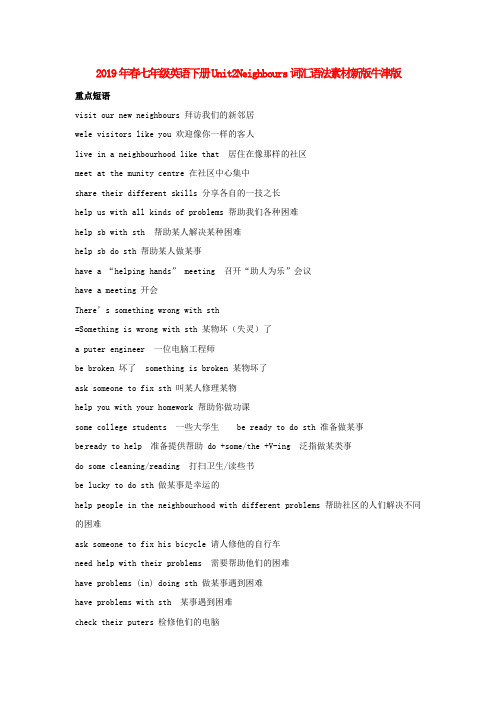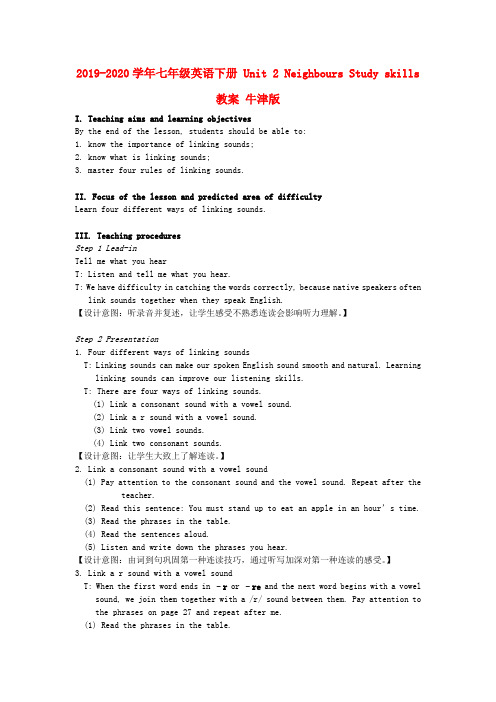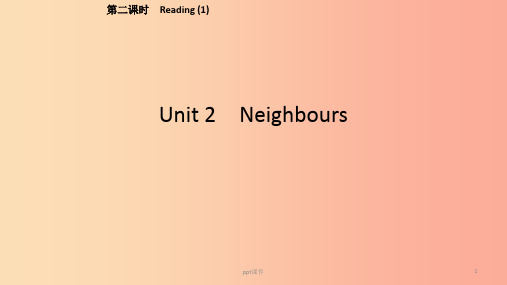2019-2020学年(春季版)七年级英语下册Unit2NeighboursReading学案新版牛津版.doc
- 格式:doc
- 大小:23.00 KB
- 文档页数:3


2019年春七年级英语下册Unit2Neighbours词汇语法素材新版牛津版重点短语visit our new neighbours 拜访我们的新邻居wele visitors like you 欢迎像你一样的客人live in a neighbourhood like that 居住在像那样的社区meet at the munity centre 在社区中心集中share their different skills 分享各自的一技之长help us with all kinds of problems 帮助我们各种困难help sb with sth 帮助某人解决某种困难help sb do sth 帮助某人做某事have a “helping hands” meeting 召开“助人为乐”会议have a meeting 开会There’s something wrong with sth=Something is wrong with sth 某物坏(失灵)了a puter engineer 一位电脑工程师be broken 坏了 something is broken 某物坏了ask someone to fix sth 叫某人修理某物help you with your homework 帮助你做功课some college students 一些大学生 be ready to do sth 准备做某事be ready to help 准备提供帮助 do +some/the +V-ing 泛指做某类事do some cleaning/reading 打扫卫生/读些书be lucky to do sth 做某事是幸运的help people in the neighbourhood with different problems 帮助社区的人们解决不同的困难ask someone to fix his bicycle 请人修他的自行车need help with their problems 需要帮助他们的困难have problems (in) doing sth 做某事遇到困难have problems with sth 某事遇到困难check their puters 检修他们的电脑find someone to fix things like broken bicycles 找人修理像坏自行车之类的东西be like a big family 像个大家庭take an umbrella with sb 随身携带一把雨伞wait for us to call back 等我们回电 wait for your call 等你的电话be free 自由的、空闲的 be going to be late 将要迟到了be (so) cloudy 多云 plan a day out 计划外出一天the day after tomorrow 后天 bring some water 带些水make a fire生火cook some food煮食物an office worker 办公室人员 in a police station 在警察所in a post office 在邮局 in the town centre 在镇中心Wendy’s elder brother/sister文迪的哥哥/姐姐be busy with sth 忙于某事be busy doing sth 忙于做某事 work for a pany 效力于一家公司far away from her home 远离她的家 in the future 将来be a puter engineer 做一名电脑工程师sound like a good idea 听起来像是好主意help sick people 帮助病人 be an artist 做一位艺术家in an hour 一小时后 turn on / off 开/关(电器按钮等)go in 进去;进入 go in for 参加,从事next team 下学期 keep busy 保持忙碌cold drink 冷饮料 on the afternoon of 5 March 在3月5日下午look at the information below 看下列信息 feel well 感觉身体好make you feel better 使你感觉更好worry about sth / (not)doing sth 担心某物/担心(不)做某事all our group members 我们所有的团体成员give you some ideas 给你一些建议what to wear to a party 穿什么去参加晚会how to design their home 怎样设计他们的家园重点句型1. What are your neighbours like?= How are you neighbours?你的邻居们(性格品质)如何?What be sb/sth like?你认为…怎么样(性格品质)?(用形容词回答)What do/does sb. like?某人喜欢什么?What do/does sb. look like?某人长什么样子(外貌)?2. Are you not feeling well these days? 你最近觉得不舒服吗?I’m not feeling well.= I don’t feel well. “well”此处是形容词,表示身体好的。

Unit 2 Neighbours知识归纳与拓展【词汇解析】1. visitorvisitor是可数名词,意为“游客,参观者”,其复数形式是visitors。
visitor的动词形式是visit,意为“参观,访问”; visit也可用作名词,常构成短语pay a visit to,相当于动词visit。
如:Visitors often do some shopping in local shops.游客们常在当地商店购物。
We will visit the Palace Museum next week.下周我们将参观故宫。
Some American students will pay a visit to our school next month.下个月,一些美国学生将访问我们学校。
2. likelike作介词时,意思是“像,类似”,不可作句子的谓动词,常与“be”动词一起使用,或构成短语look like,意为“看起来像”;like作动词时,意为“喜欢”。
如:They don’t welcome a visitor like you.他们不欢迎像你这样的来访者。
The boy looks like his father.这个男孩看起来像他爸爸。
Everyone in my class like learning English very much.我班上的每个人都非常喜欢学英语。
【拓展】like的反义词有两个:dislike是动词,意为“不喜欢”,相当于hate;unlike 是介词,意为“不像”。
3. luckylucky是形容词,意为“幸运的”,可以作表语或作定语修饰名词,常用结构有:be lucky to do sth.意为“做某事是幸运的”;It is lucky of sb. to do sth.意为“某人做某事真幸运”。
如:He is really a lucky boy.他真是个幸运儿。

2019-2020学年七年级英语下册 Unit 2 Neighbours Study skills教案牛津版I. Teaching aims and learning objectivesBy the end of the lesson, students should be able to:1. know the importance of linking sounds;2. know what is linking sounds;3. master four rules of linking sounds.II. Focus of the lesson and predicted area of difficultyLearn four different ways of linking sounds.III. Teaching proceduresStep 1 Lead-inTell me what you hearT: Listen and tell me what you hear.T: We have difficulty in catching the words correctly, because native speakers often link sounds together when they speak English.【设计意图:听录音并复述,让学生感受不熟悉连读会影响听力理解。
】Step 2 Presentation1. Four different ways of linking soundsT: Linking sounds can make our spoken English sound smooth and natural. Learning linking sounds can improve our listening skills.T: There are four ways of linking sounds.(1) Link a consonant sound with a vowel sound.(2) Link a r sound with a vowel sound.(3) Link two vowel sounds.(4) Link two consonant sounds.【设计意图:让学生大致上了解连读。

Unit 2 Neighbours 知识精讲一、必背词汇neighbour n. <英>邻居 =<美>neighborwill modal v. 将,将会visitor n. 访问者,参观者like prep. 像,类似;……怎么样waiter n. (餐馆等的)服务员neighbourhood n. <英>街区,居民区 =<美>neighborhood helpful adj. 愿意帮忙的;有用的volunteer n. 志愿者,义务工作者community n. 社区skill n. 技能,技巧problem n. 问题,难题something pron. 某事,某物engineer n. 工程师;技师check vt. 检查;核实broken adj. 损坏了的;破碎的someone pron. 某人fix vt. 修理anyone pron. 任何人college n. 学院lucky adj. 幸运的shall v. 将,将会fire n. 火manager n. 经理office n. 办公室policeman n. (pl. policemen)警察postman n. (postmen)邮递员company n. 公司station n. 局,所,站post n. 邮政person n. 人job n. 工作elder adj. 年纪较长的future n. 将来artist n. 艺术家,(尤指)画家sound v. 听起来sick adj. 生病的;恶心的notice n. 布告,通知information n. 信息below adv. 下面better adj. (good/well的比较级)较好,更好anything pron. 任何事design vt 设计,构思group n. 组,群二、重点词汇1. neighbour noun /ˈneɪ.bər/1). someone who lives very close to you邻居例句:Some of the neighbours have complained about the noise from our party.有些邻居已经抱怨过我们的聚会太喧闹。

Unit 2 NeighboursComic strip&Welcome to the unit【要点梳理】1.重点词汇详解2.重要句型详解要点一:词汇详解1. neighbour n. 邻居美国英语写作 neighborneighbourhood n. 街坊,四邻,居民区,城区 a poor neighborhood 贫民区,【例】I often do something around my neighborhood.We want to live in the neighbourhood of London.2. visitor n.访问者;参观者,客人,旅客visit v. n. 参观,访问,预览 visit a factory 参观工厂go on a visit to the seaside 去海边参观【例】Visitors mustn’t take photos in the palace.These days our school gets a lot of visitors from the US.3. waiter n. (男)侍者;(男)服务员>waitress n. 女招待,女服务员wait v. 等待,等候 wait for sb. 等待某人迫不及待做某事: .要点二:句型详解1.I’m afraid they won’t welcome visitors like you.(1)I’m afraid+从句恐怕,不能翻译成我害怕,通常不写成He’s afraid或She’s afraidafraid的用法:be afraid of doing sth./sth.①害怕做某事、不敢做某事=be afraid to do sth./【例】Are you afraid of snakesDon't be afraid of asking for help.That little girl is afraid to go out alone.②唯恐......【例】She closed the door very quietly, as she was afraid of wakening her baby.(2)句中like是介词,意为“像,相似’’,其反义词是unlike;2. Most of them have 14 floors.most of意为“……中的大多数”,后面接可数名词复数作主语时,谓语动词用复数形式;也可接不可数名词,此时谓语动词用单数形式。